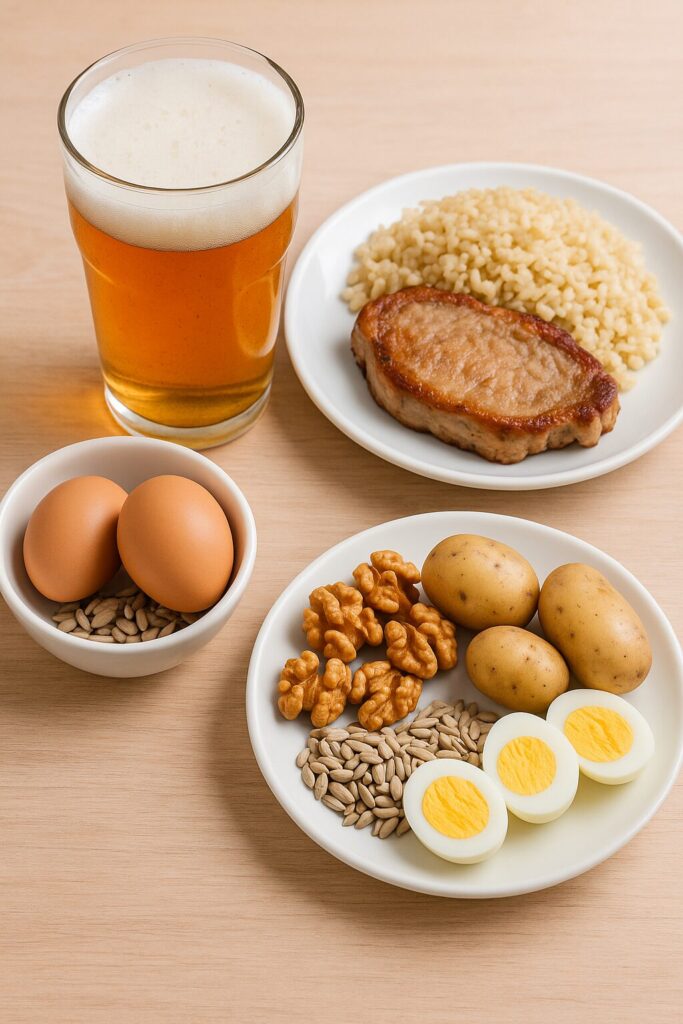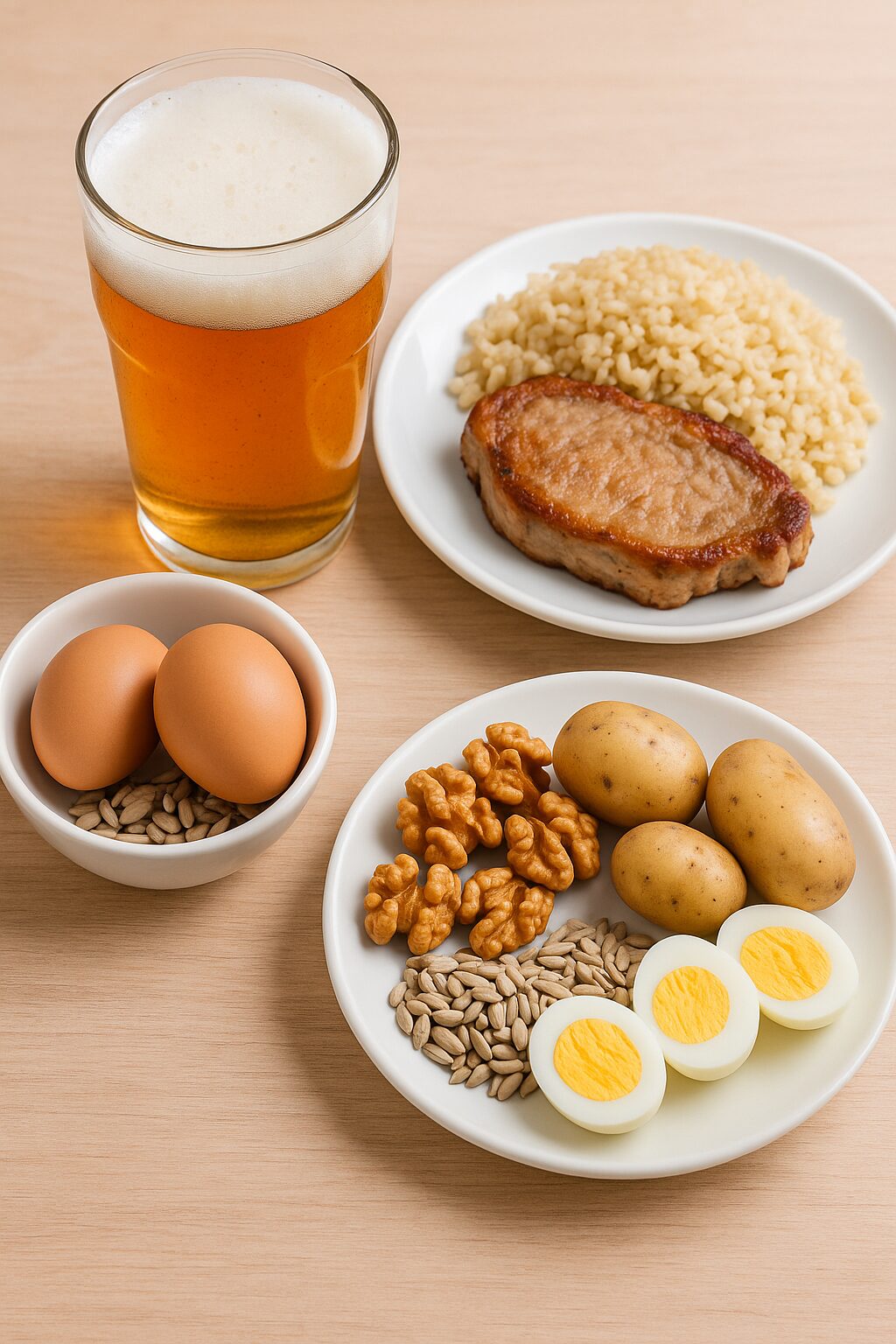Do you often feel exhausted after social drinking or experience frequent hangovers that last longer than expected? Many people assume this is just a natural result of alcohol, but in reality, it may signal a deeper nutritional imbalance. One of the key nutrients affected by alcohol consumption is Vitamin B1, also known as thiamine. This essential vitamin plays a vital role in energy production, nerve health, and brain function. In this article, we will explore why alcohol interferes with thiamine absorption, the potential health risks of deficiency, and practical steps to restore balance through diet and lifestyle.

Balanced meal with pork, eggs, nuts, and beer, showing foods rich in Vitamin B1 and the effect of alcohol consumption
1. The Role of Vitamin B1 in the Body
Vitamin B1, or thiamine, is a water-soluble vitamin that supports the body’s ability to turn food into energy. It is especially important for carbohydrate metabolism, helping convert glucose into ATP, the energy currency of cells. Beyond energy, thiamine contributes to proper nerve signaling and brain health, ensuring that memory, focus, and coordination remain stable. Without enough thiamine, even small daily tasks can feel exhausting, leading to chronic fatigue and irritability.
2. How Alcohol Affects Thiamine Levels
Excessive alcohol intake directly interferes with thiamine absorption in the digestive system. Alcohol reduces the efficiency of intestinal transporters that carry Vitamin B1 into the bloodstream. It also increases urinary excretion, meaning thiamine leaves the body faster than it can be replenished. Furthermore, many heavy drinkers tend to have poor diets, which reduces intake of thiamine-rich foods such as whole grains, legumes, and lean meats. Over time, this triple effect—lower absorption, higher loss, and reduced intake—can lead to severe thiamine deficiency.
3. Symptoms of Thiamine Deficiency in Heavy Drinkers
When alcohol-related thiamine deficiency develops, symptoms may range from subtle to severe. Common early signs include fatigue, irritability, muscle weakness, and tingling sensations in the hands or feet. As deficiency progresses, it can result in beriberi—a condition marked by nerve damage, heart problems, and extreme weakness. In the most serious cases, thiamine deficiency may lead to Wernicke-Korsakoff syndrome, a neurological disorder characterized by confusion, memory loss, and coordination issues. These risks highlight why prevention and early correction are so critical.
4. The Link Between Alcohol, Brain Health, and Thiamine
Alcohol and brain health have a complicated relationship, and thiamine deficiency worsens the situation. Since thiamine is essential for neurotransmitter production and nerve conduction, low levels can impair brain function. Heavy drinkers who do not address thiamine loss may notice reduced concentration, frequent mood swings, and slower reflexes. In clinical settings, thiamine supplementation is often the first step in treating patients with alcohol-related brain complications.
5. Thiamine-Rich Foods for Recovery
Fortunately, replenishing thiamine levels is possible with dietary adjustments. Good food sources include:
- Whole grains (brown rice, oats, whole wheat bread)
- Legumes (beans, lentils, peas)
- Pork (one of the richest sources of thiamine)
- Fish (trout, tuna)
- Nuts and seeds (sunflower seeds, macadamia nuts)
Incorporating these foods regularly can help balance nutrient levels, even for those who occasionally consume alcohol. A simple example would be pairing lean pork with a side of brown rice and steamed vegetables—a nutrient-dense meal that restores energy.
6. When Supplements Are Necessary
For people with a history of heavy drinking, food alone may not be enough. In such cases, thiamine supplements are often recommended. Doctors may prescribe high-dose thiamine tablets or injections, especially for patients showing signs of deficiency. However, it is important not to self-prescribe large doses, as supplementation should be tailored to individual health status. Consulting a healthcare professional ensures the correct dosage and prevents complications.
7. Lifestyle Strategies for Better Balance
Alongside nutrition, lifestyle changes can reduce the negative impact of alcohol on thiamine levels. Strategies include:
- Limiting alcohol intake to moderate levels
- Balancing each drink with water to prevent dehydration
- Eating thiamine-rich snacks before or after drinking
- Scheduling alcohol-free days to allow the body to recover
Even small adjustments like these can reduce the risk of deficiency and support long-term health.
🙂
Vitamin B1 is an essential nutrient that alcohol tends to deplete most aggressively. For heavy drinkers, paying attention to thiamine intake is not just about avoiding fatigue but also about protecting nerves, memory, and overall brain health. Whether through
